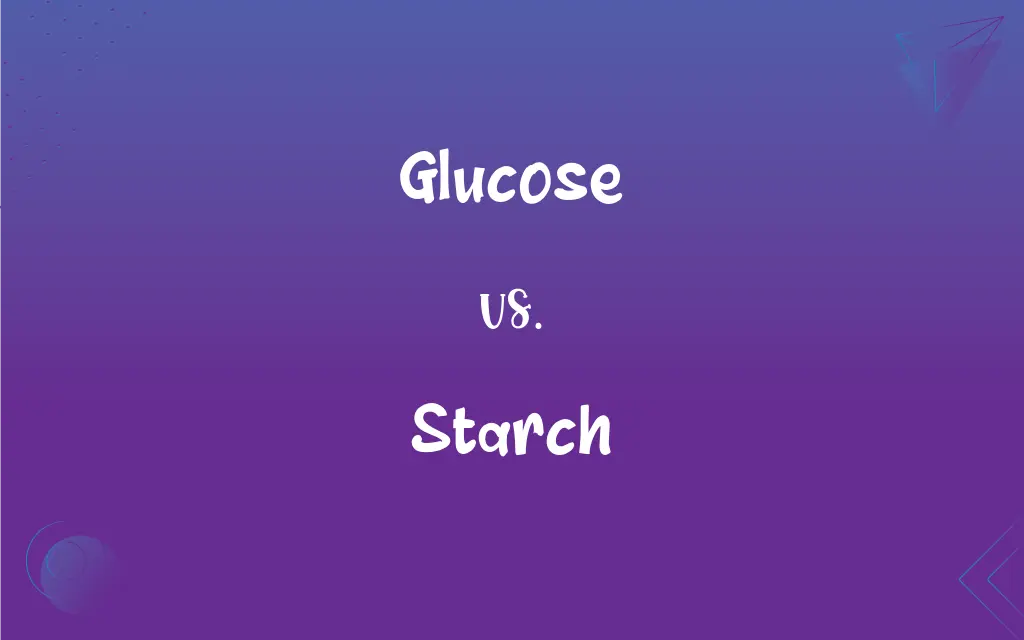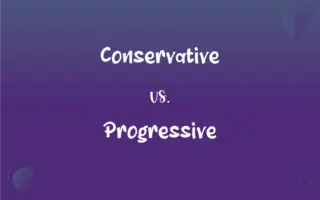Glucose vs. Starch: What's the Difference?
Edited by Aimie Carlson || By Harlon Moss || Published on January 29, 2024
Glucose is a simple sugar and a key energy source, while starch is a complex carbohydrate composed of numerous glucose units.

Key Differences
Glucose is a monosaccharide, the simplest form of sugar, providing immediate energy. Starch, in contrast, is a polysaccharide, a complex carbohydrate made of long chains of glucose, serving as a stored energy source.
Glucose is readily absorbed into the bloodstream, offering quick energy. Starch, however, requires enzymatic breakdown into glucose before absorption, providing sustained energy.
Glucose is a primary energy source for cells and a critical component in cellular respiration. Starch serves as a vital energy reserve, especially in plants, releasing glucose when needed.
Glucose is found in fruits, honey, and sweetened products. Starch is abundant in foods like potatoes, rice, and bread, making up a significant part of human diets.
Excessive glucose intake can lead to blood sugar spikes and health issues like diabetes. Overconsumption of starch can contribute to weight gain and related health concerns.
ADVERTISEMENT
Comparison Chart
Type
Simple sugar (monosaccharide)
Complex carbohydrate (polysaccharide)
Energy Release
Immediate
Gradual
Digestion
Direct absorption
Requires breakdown
Dietary Sources
Fruits, honey, sweets
Potatoes, rice, bread
Health Impact
Can cause blood sugar spikes
May lead to weight gain if overconsumed
ADVERTISEMENT
Glucose and Starch Definitions
Glucose
Glucose is a primary energy source for living organisms.
Cells use glucose to produce ATP.
Starch
Starch is a polysaccharide consisting of glucose units.
Starch in potatoes breaks down into glucose during digestion.
Glucose
Glucose is a simple sugar essential for energy production.
Athletes often consume glucose for quick energy.
Starch
Starch serves as an energy storage molecule in plants.
Rice and wheat are rich in starch for energy.
Glucose
As a monosaccharide, glucose is a basic unit of carbohydrates.
Glucose molecules bond to form more complex sugars.
Starch
Starch is a common dietary carbohydrate.
Starch is a staple in many diets around the world.
Glucose
Glucose is the main component of blood sugar in humans.
Diabetics must regularly monitor their glucose levels.
Starch
As a complex carbohydrate, starch is broken down slowly.
Starches provide longer-lasting energy than simple sugars.
Glucose
Glucose is produced by plants during photosynthesis.
Plants convert sunlight into glucose.
Starch
Starch is often used as a thickener in cooking.
Cornstarch is used to thicken sauces and gravies.
Glucose
A monosaccharide sugar, C6H12O6, that is used by living things to obtain energy through the process of aerobic respiration within cells. It is the principal circulating sugar in the blood of humans and other mammals.
Starch
A naturally abundant nutrient carbohydrate, (C6H10O5)n, found chiefly in the seeds, fruits, tubers, roots, and stem pith of plants, notably in corn, potatoes, wheat, and rice, and varying widely in appearance according to source but commonly prepared as a white amorphous tasteless powder.
Glucose
A colorless to yellowish syrupy mixture of dextrose, maltose, and dextrins containing about 20 percent water, used in confectionery, alcoholic fermentation, tanning, and treating tobacco. Also called starch syrup.
Glucose
(carbohydrate) A simple monosaccharide (sugar) with a molecular formula of C6H12O6; it is a principle source of energy for cellular metabolism.
Glucose
A variety of sugar occurring in nature very abundantly, as in ripe grapes, and in honey, and produced in great quantities from starch, etc., by the action of heat and acids. It is only about half as sweet as cane sugar. Called also dextrose, grape sugar, diabetic sugar, and starch sugar. See Dextrose.
Glucose
Any one of a large class of sugars, isometric with glucose proper, and including levulose, galactose, etc.
Glucose
The trade name of a sirup, obtained as an uncrystallizable reside in the manufacture of glucose proper, and containing, in addition to some dextrose or glucose, also maltose, dextrin, etc. It is used as a cheap adulterant of sirups, beers, etc.
Glucose
A monosaccharide sugar that has several forms; an important source of physiological energy
FAQs
How does the body use glucose and starch?
The body uses glucose for immediate energy, while starch is stored for later use.
Can our body convert starch to glucose?
Yes, through digestion, starch is broken down into glucose.
Are glucose and starch found in the same foods?
They are found in different foods; glucose in sweet foods, and starch in items like potatoes and grains.
What happens if we consume too much glucose?
Excess glucose can lead to health issues like diabetes and obesity.
Is starch a good source of energy for athletes?
Yes, starch provides sustained energy, beneficial for athletes.
What is starch?
Starch is a complex carbohydrate, composed of glucose units, used for energy storage.
How does glucose affect blood sugar levels?
Glucose directly increases blood sugar levels.
Do plants produce both glucose and starch?
Yes, plants produce glucose through photosynthesis and store energy as starch.
Can people be allergic to glucose or starch?
Allergies to glucose are rare, but some may have sensitivities to certain starches.
Is starch beneficial for weight management?
In moderation, starch can be part of a balanced diet for weight management.
What is glucose?
Glucose is a simple sugar and vital energy source for cells.
Is glucose important for brain function?
Absolutely, the brain primarily uses glucose for energy.
How does the body store starch?
The body stores starch as glycogen in the liver and muscles.
Can glucose be used to treat medical conditions?
Yes, glucose solutions are used in medical treatments, especially for low blood sugar.
What role does starch play in a plant's life cycle?
Starch provides energy for growth and development in plants.
How are glucose and starch used in the food industry?
Glucose is used as a sweetener, while starch is a thickener and stabilizer.
Is glucose present in all living organisms?
Almost all organisms use glucose for energy.
Does cooking affect starch content in food?
Cooking can alter the structure of starch, making it more digestible.
Can glucose and starch affect athletic performance?
Yes, both are important for energy and endurance in athletes.
How do dietary recommendations for glucose and starch differ?
Recommendations focus on balanced intake of glucose and complex carbohydrates like starch.
About Author
Written by
Harlon MossHarlon is a seasoned quality moderator and accomplished content writer for Difference Wiki. An alumnus of the prestigious University of California, he earned his degree in Computer Science. Leveraging his academic background, Harlon brings a meticulous and informed perspective to his work, ensuring content accuracy and excellence.
Edited by
Aimie CarlsonAimie Carlson, holding a master's degree in English literature, is a fervent English language enthusiast. She lends her writing talents to Difference Wiki, a prominent website that specializes in comparisons, offering readers insightful analyses that both captivate and inform.







































































